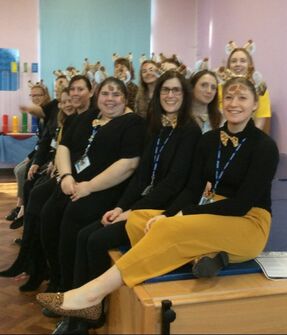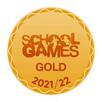English at IVJS
|
In our English curriculum, pupils learn to understand, express ideas and convey information effectively, in both spoken and written form. Pupils from Year 3 to 6 engage in a daily one hour English lesson, with an extended editing and publishing session once a fortnight. Pupils are encouraged to work collaboratively and cooperatively as well as independently, as they develop their skills in the subject. Our aim is to ensure that quality children's literature is at the heart of all learning and through the CLPE's Power of Reading programme to raise engagement and attainment in reading and writing for all pupils.
|

Spoken language
Our aim is that pupils leave IVJS as fluent speakers who can confidently communicate with others. High quality speaking and listening underpins our curriculum, as we believe that speaking well is crucial to success in all subjects, and to fully participating as a member of society. Pupils are taught to clarify their ideas to themselves as well as others, and speak for different purposes, such as making formal presentations and participating in debates (e.g. British Values Days).
We believe that speaking well is particularly important for pupils’ development of reading and writing. Drama and role play are also used to help pupils develop their speaking skills and expressive use of language, as well as to deepen their understanding of other areas of the curriculum.
Our aim is that pupils leave IVJS as fluent speakers who can confidently communicate with others. High quality speaking and listening underpins our curriculum, as we believe that speaking well is crucial to success in all subjects, and to fully participating as a member of society. Pupils are taught to clarify their ideas to themselves as well as others, and speak for different purposes, such as making formal presentations and participating in debates (e.g. British Values Days).
We believe that speaking well is particularly important for pupils’ development of reading and writing. Drama and role play are also used to help pupils develop their speaking skills and expressive use of language, as well as to deepen their understanding of other areas of the curriculum.
Reading
Our goal is to teach pupils to read with high enjoyment, fluency and understanding. Reading for pleasure is a high priority in the National Curriculum, enabling pupils to “develop culturally, emotionally, intellectually, socially and spiritually. Literature, especially, plays a key role in such development.” (National Curriculum 2014). We want pupils to develop a lifelong love of reading for both study and pleasure. Pupils experience a range of authors and styles of texts. As well as choosing and reading books for themselves, they enjoy a daily ‘story time’ where they are read to by their teacher. In addition to their English lessons, KS2 pupils are grouped to ensure that they are reading a text with the correct level of challenge. This also ensures that teaching is specifically targeted to meet the needs of the pupils in that group. Our annual World Book Day and Book Week is a celebration of reading, where every pupil receives a free book, attend book fairs and sometimes even meet authors. Parents, teachers and pupils come together to share their love of reading during our Reading Rocks sessions. Our use of the CLPE's Power of Reading programme helps to raise engagement and attainment in reading for all pupils. The children have 6 dedicated texts to absorb during the year and often seek other works by their related authors.
Our goal is to teach pupils to read with high enjoyment, fluency and understanding. Reading for pleasure is a high priority in the National Curriculum, enabling pupils to “develop culturally, emotionally, intellectually, socially and spiritually. Literature, especially, plays a key role in such development.” (National Curriculum 2014). We want pupils to develop a lifelong love of reading for both study and pleasure. Pupils experience a range of authors and styles of texts. As well as choosing and reading books for themselves, they enjoy a daily ‘story time’ where they are read to by their teacher. In addition to their English lessons, KS2 pupils are grouped to ensure that they are reading a text with the correct level of challenge. This also ensures that teaching is specifically targeted to meet the needs of the pupils in that group. Our annual World Book Day and Book Week is a celebration of reading, where every pupil receives a free book, attend book fairs and sometimes even meet authors. Parents, teachers and pupils come together to share their love of reading during our Reading Rocks sessions. Our use of the CLPE's Power of Reading programme helps to raise engagement and attainment in reading for all pupils. The children have 6 dedicated texts to absorb during the year and often seek other works by their related authors.
|
Writing
Writing is a key life skill as well as an important vehicle for self-expression. Our pupils are motivated to see themselves as writers and to take pride in, and ownership of, their written work. They are taught to write for different purposes and in different forms, both factual and creative. We encourage pupils to consider the audience and purpose for their work and expect a high level of presentation. We believe that our pupils’ understanding of structure, language, punctuation and grammar is deepened through the Power of Reading scheme and enables them to make good progress in writing. We encourage pupils to see themselves as storytellers.. In addition, every English lesson begins with a 5 - 10 minute focus on grammar or punctuation, in order to further develop these essential skills. Spelling and handwriting are also given high priority, both within lessons and as a discrete teaching focus. Writing is a two week cycle that ends with the children editing and publishing their work trying to ensure that it is free from error but furthermore, includes all of the criteria laid out in the STA assessment framework. |
Phonics
We use the Read Write Inc. Synthetic Phonics Scheme (RWInc.) to teach reading and spelling where appropriate in Year 3. Teachers and TAs work with small groups, or in a one to one situation, where teaching is specifically targeted to meet the needs of the pupils. Pupils regularly read in pairs, discuss their reading and feedback to the rest of the group. They are also expected and encouraged to read their RWI book at home every day. These sessions are designed to build on pupils’ confidence and give them the skills to become fluent, independent readers and accurate spellers.
We use the Read Write Inc. Synthetic Phonics Scheme (RWInc.) to teach reading and spelling where appropriate in Year 3. Teachers and TAs work with small groups, or in a one to one situation, where teaching is specifically targeted to meet the needs of the pupils. Pupils regularly read in pairs, discuss their reading and feedback to the rest of the group. They are also expected and encouraged to read their RWI book at home every day. These sessions are designed to build on pupils’ confidence and give them the skills to become fluent, independent readers and accurate spellers.












